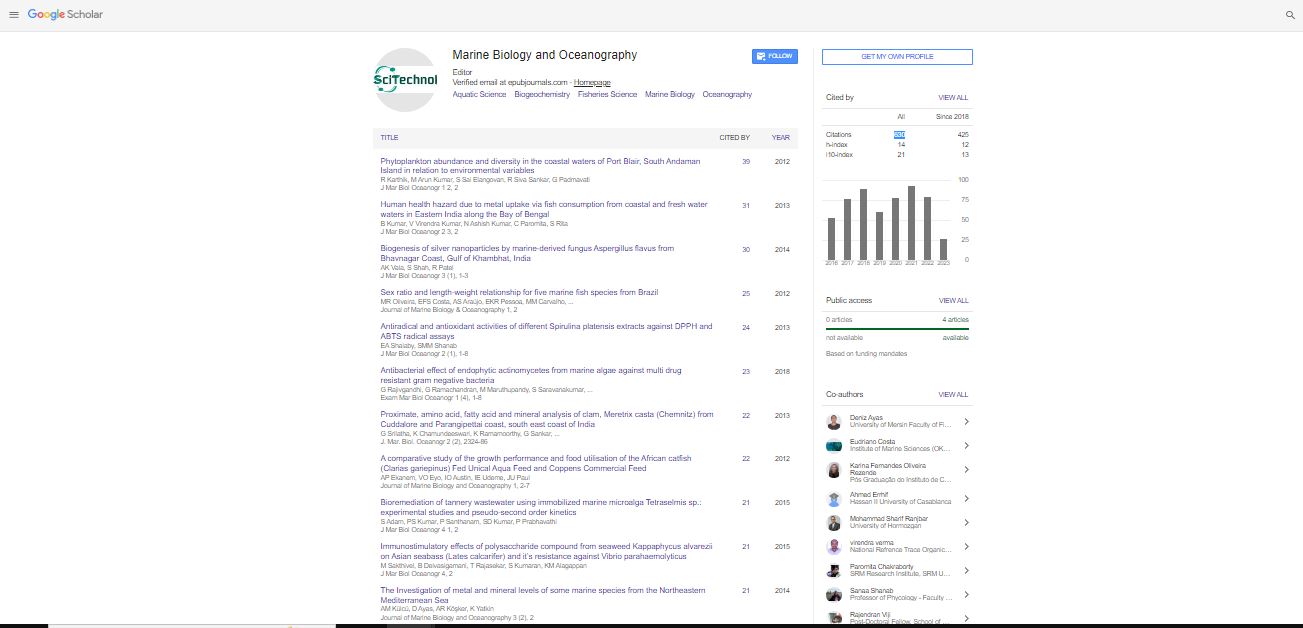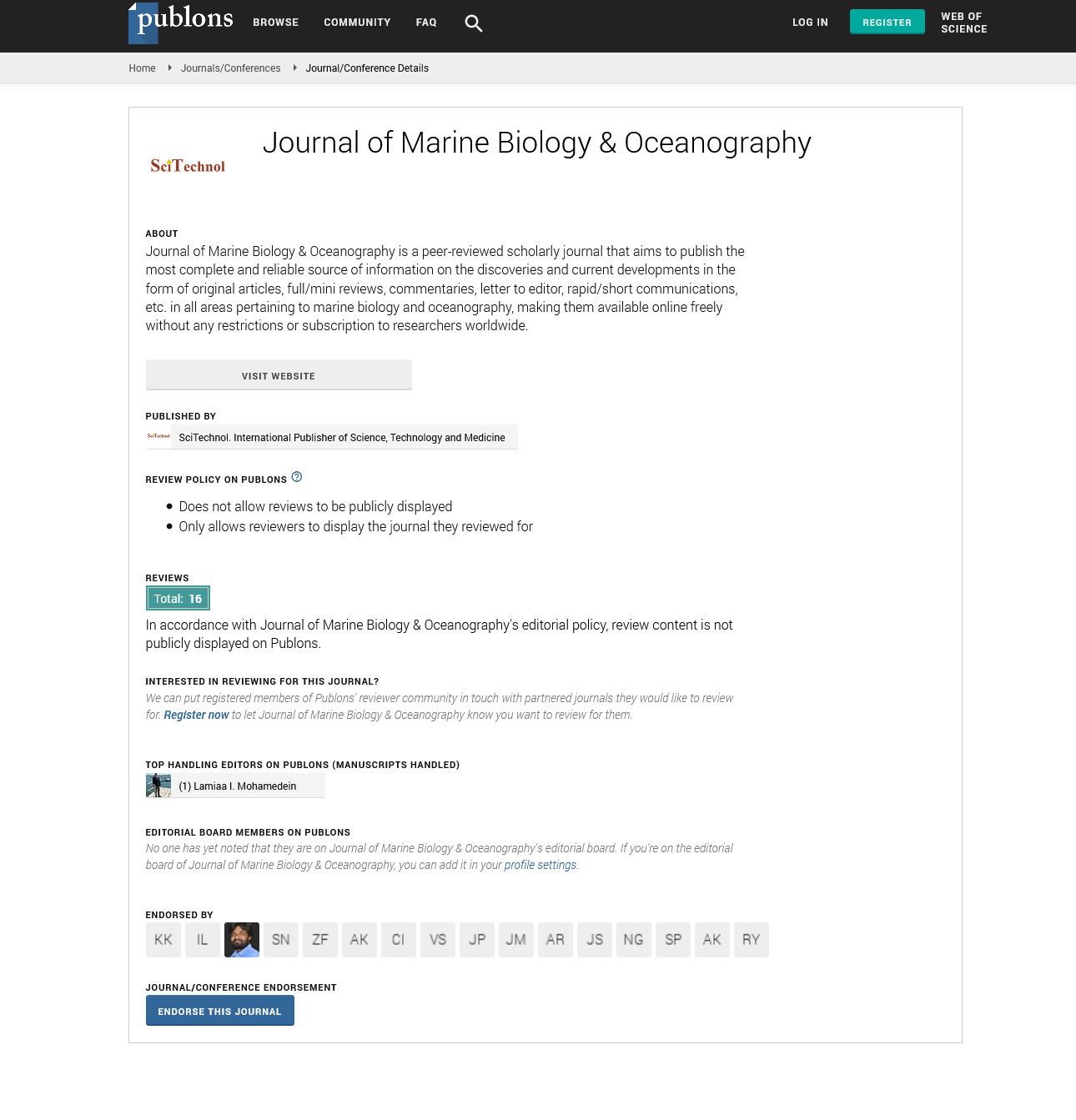Opinion Article, J Mar Biol Oceanogr Vol: 12 Issue: 2
Ecological Significance and Conservation Challenges of Anthozoa
Denis Capel*
Department of Zoology, Institute of Biosciences, University of Sao Paulo, Sao Paulo, Brazil
*Corresponding Author: Denis Capel
Department of Zoology, Institute of Biosciences
University of Sao Paulo, Sao Paulo, Brazil
E-mail: deniscapel@usp77.br
Received date: 22 March, 2023, Manuscript No. JMBO-23-98605;
Editor assigned date: 24 March, 2023, PreQC No. JMBO-23-98605 (PQ);
Reviewed date: 07 April, 2023, QC No. JMBO-23-98605;
Revised date: 14 April, 2023, Manuscript No. JMBO-23-98605 (R);
Published date: 21 April, 2023, DOI: 10.4172/2324-8661.1000257
Citation: Capel D (2023) Ecological Significance and Conservation Challenges of Anthozoa. J Mar Biol Oceanogr 12:2.
Description
Anthozoa, a class of marine invertebrates, encompasses a diverse group of organisms that includes coral polyps, sea anemones, and their relatives. These creatures play a vital role in the ecological balance of the oceans, forming complex and vibrant coral reef ecosystems. However, anthozoa also face numerous conservation challenges due to human activities and environmental changes. Anthozoa are the primary builders of coral reefs, which are among the most diverse and productive ecosystems on Earth. Coral reefs provide habitat, shelter, and food for an array of marine organisms, supporting a vast web of life. The intricate structures developed by anthozoa provide protection to countless fish species, invertebrates, and microorganisms, serving as breeding grounds and nurseries for marine life. Moreover, coral reefs contribute to the regulation of coastal erosion, carbon sequestration, and the overall health of the planet's oceans.
Anthozoa also play an essential role in nutrient cycling within marine ecosystems. Through their symbiotic relationship with photosynthetic algae called zooxanthellae, coral polyps convert sunlight into energy, providing a food source for themselves and other organisms. The excretion of waste products by anthozoa becomes a source of nourishment for filter-feeding organisms and plankton, further fueling the intricate food web of the ocean. Despite their ecological significance, anthozoa face severe conservation challenges that threaten their survival and the health of coral reef ecosystems.
Human activities, such as overfishing, destructive fishing practices, pollution, and coastal development, pose significant threats to anthozoa populations.
Climate change represents one of the most significant challenges for anthozoa conservation. Rising sea temperatures, ocean acidification, and extreme weather events have catastrophic effects on coral reefs. Elevated water temperatures cause coral bleaching, where the symbiotic relationship between anthozoa and zooxanthellae breaks down, leading to the death of coral polyps. Ocean acidification, resulting from increased carbon dioxide absorption, inhibits coral growth and impairs their ability to build and maintain reef structures. To address these challenges and protect anthozoa, a multi-faceted approach is necessary. Conservation efforts focus on mitigating local stressors, reducing pollution, and implementing sustainable fishing practices. Establishing Marine Protected Areas (MPAs) helps safeguard coral reefs and anthozoa populations by limiting fishing pressure, regulating tourism activities, and enforcing strict conservation measures.
Restoration initiatives play a key role in rebuilding damaged coral reefs. Techniques such as coral gardening, where fragments of healthy corals are cultivated and transplanted onto degraded reefs, have shown promising results in accelerating reef recovery. Additionally, raising public awareness and engaging local communities in conservation efforts are vital for promoting sustainable practices and reducing the impact of human activities on anthozoa. Addressing climate change is paramount for the continued existence and well-being of anthozoa and coral reef ecosystems. The global rise in greenhouse gas emissions is causing unprecedented changes in the climate system, with detrimental consequences for coral reefs. Urgent action is needed to mitigate the effects of climate change and promote resilience in the anthozoa populations.
Conclusion
Preventing climate change is of utmost importance for the continued existence and thriving of anthozoa and coral reef ecosystems. One can work towards a future where anthozoa and coral reefs are resilient and thrive in a changing climate by lowering carbon emissions, implementing adaptation measures, increasing international cooperation, and raising public awareness. The conservation of these magnificent organisms and their ecosystems is not only important for biodiversity but also for the countless benefits they provide to human societies, including coastal protection, tourism, and food security.
 Spanish
Spanish  Chinese
Chinese  Russian
Russian  German
German  French
French  Japanese
Japanese  Portuguese
Portuguese  Hindi
Hindi 
